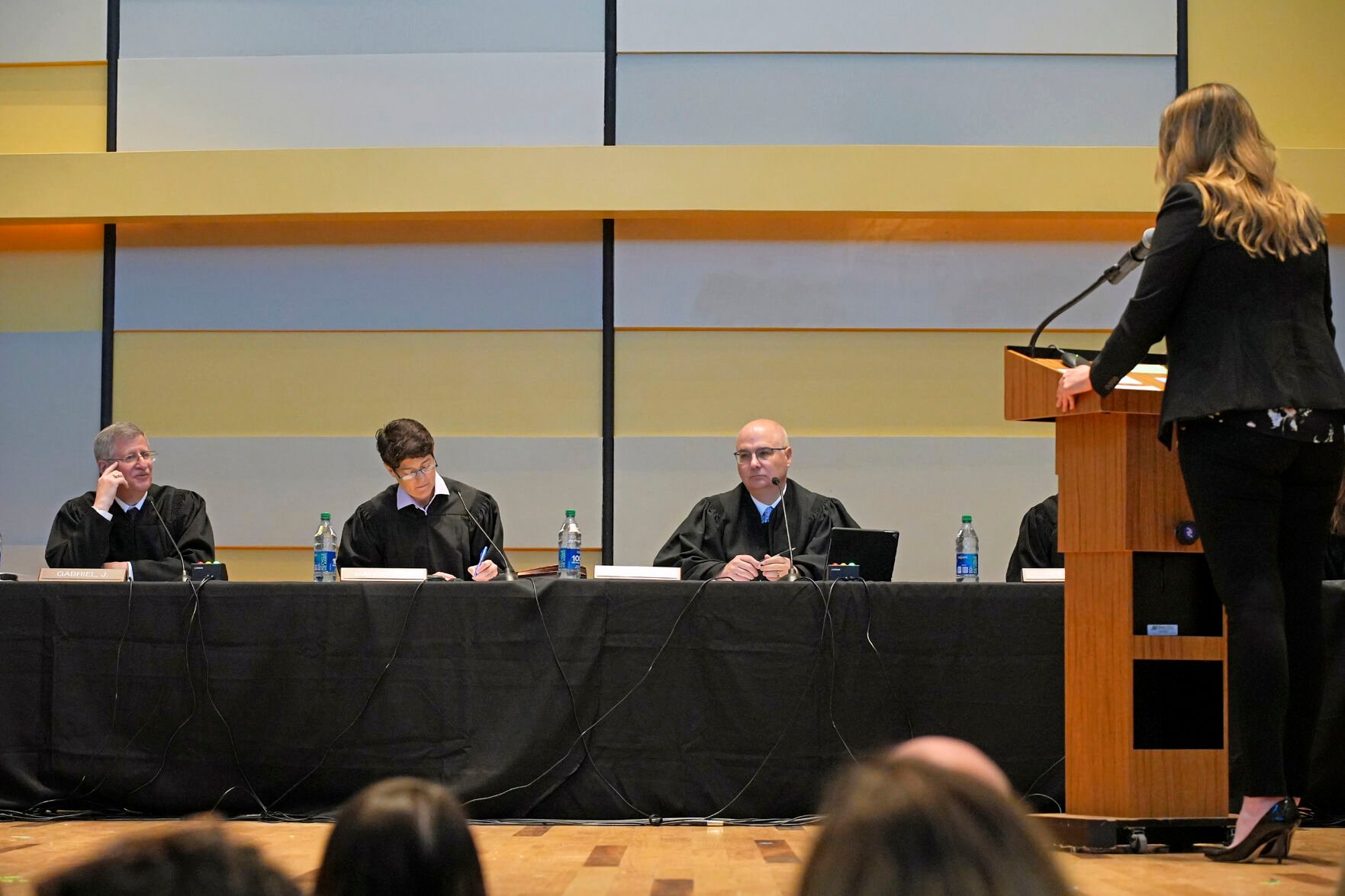Federal judge nominee advances, state appellate judges discuss court operations | COURT CRAWL

Welcome to Court Crawl, Colorado Politics’ roundup of news from the third branch of government.
The U.S. Senate Judiciary Committee advanced a Colorado judicial nominee who had been stuck for weeks, and the state’s appellate judges and justices gave an inside glimpse at their own operations during an annual conference.
Nominee clears committee hurdle
? U.S. Magistrate Judge S. Kato Crews, who the Biden administration has nominated for a life-tenured judgeship on Colorado’s U.S. District Court, appeared to be stuck in the Judiciary Committee last week. But suddenly, U.S. Sen. Dianne Feinstein, D-Calif., walked into a committee meeting, more than an hour late, to cast the deciding vote advancing Crews’ nomination.
? It was unclear whether the 89-year-old Feinstein would even show, considering she arrived by wheelchair at the U.S. Capitol the day prior – the first time the ailing senator had appeared at work since her hospitalization in February. Republicans indicated they wouldn’t give Crews any votes, citing his inability to recall a key U.S. Supreme Court case under questioning at his confirmation hearing. (U.S. Sen. Ted Cruz, R-Texas, was so livid, in fact, that he mistook Crews for a woman.)
? Another recent judicial nominee from Colorado, U.S. District Court Judge Charlotte N. Sweeney, also received no Republican votes in committee. Unlike Crews, no senators asked her any questions at her hearing. To Colorado Politics’ knowledge, no senator publicly detailed their reasons for opposing Sweeney, the first openly gay federal judge for Colorado.
Peek into the appellate courts
? Earlier this month, nearly all of Colorado’s Supreme Court justices and half of the Court of Appeals judges participated in a conference with attorneys to provide updates on their respective venues and give advice to those who litigate in them. Colorado Politics attended the daylong program; here are some highlights:

How members of the Supreme Court informally discuss cases prior to oral arguments: “I might go into Justice Gabriel’s chambers and ask, ‘Hey, what are you thinking about this issue?’ Or he might come into my chambers and ask about a criminal question. … Sometimes it’s through email and sometimes it’s two or three of us.” -Justice Carlos A. Samour Jr.
The paperwork in cases is growing: “The briefs are too long and they just seem to be getting longer and longer. We see one-issue cases repeatedly with a 55-page brief. … I think judicial opinions are too long, too, and I think we need to try to write shorter.” -Justice Richard L. Gabriel
Lawyers should know how to interpret questions during oral arguments: “Understandably, counsel gets pretty nervous when they get a question, ‘Would you agree … would you concede’. But sometimes they’re softballs. … Just be aware that sometimes we’re on your side.” -Judge Stephanie Dunn
It’s a problem that lawyers aren’t filling out evaluations for appellate judges before retention elections: “There is a fear or an apprehension about filling out the surveys and the comments that go with the surveys because there is a fear they will be discovered, particularly with their comments. So those are related: We can’t get the stats up if people are concerned about filling them out.” -Chief Judge Gilbert M. Román
Statewide news
? The Colorado Commission on Judicial Discipline released its annual report for 2022. The volume of investigations into serious judicial misconduct increased dramatically last year, while at the same time the number of corrective actions taken against judges was lower than in the recent past. Four judges either resigned or didn’t stand for retention in the face of disciplinary proceedings. As always, the vast majority of complaints were dismissed because they were unrelated to judicial misconduct.
? Colorado Politics looked at caseloads and related statistics from the state and federal courts last year. Filings are still low compared to the pre-pandemic period, but the Colorado Supreme Court, in particular, took a serious dive in the number of opinions issued.
? There will be a constitutional amendment on next year’s ballot to modify the system of judicial discipline to allow for greater transparency and a diminished role for the Supreme Court in misconduct proceedings.

Heard on appeal
? Lawmakers abolished Colorado’s death penalty three years ago, but the state constitution still denies bail to people accused of “capital offenses.” The state Supreme Court is considering whether the act of ending capital punishment also did away with “capital offenses.”
? The Supreme Court may intervene in three ongoing criminal cases involving 1.) a district attorney’s office in central Colorado that keeps withholding evidence and is prompting judges to impose severe sanctions, 2.) a man’s attempt to withdraw his guilty plea for a domestic violence offense and 3.) a Boulder County judge’s decision to exclude evidence from a sex assault trial that would change jurors’ understanding of what actually happened.
? A credit union “buried” an important update about customers’ legal rights at the bottom of an email – and then required customers to click multiple hyperlinks before getting to the actual policy. The state’s Court of Appeals ruled the credit union had provided legally sufficient notice, although one judge believed the practice was pretty shady and the law should change in response.
? A former Denver Public Schools security officer texted her administrator the N-word, which she described as an accidental voice-to-text mistranslation. The Court of Appeals said the text was still rude and offensive, meaning the officer was disqualified from receiving unemployment benefits following her termination.
? The Court of Appeals found a Delta County juror was biased because she believed a defendant was more likely to be guilty based on prior offenses, which isn’t the standard for guilt. The court ordered a new trial.
In federal news
? The U.S. Supreme Court’s decision last year that made it much easier to strike down gun safety laws as unconstitutional did not doom a federal law rendering it illegal to possess guns lacking serial numbers, a judge ruled.
? Last year, a Colorado Rockies executive said the team wouldn’t host a naturalization ceremony at its baseball stadium out of a concern it would be too “political.” For whatever reason, the Rockies changed their mind because later this month, a federal judge will administer the oath to 25 new citizens at a baseball game.

? Colorado’s federal trial court has announced it is returning to its “pre COVID-19 operational posture.” Individual judges may still implement rules on mask wearing, and people who are symptomatic or diagnosed with COVID-19 may not enter the courthouses.
Vacancies and appointments
? There are three finalists for the seat of Denver County Court Judge Tanya Wheeler, who is resigning later this month: Lisa Gomez, Heidi Kutcher and Isaam Shamsid-Deen.
? The U.S. District Court is seeking members to serve on a merit selection panel for magistrate judges. Applications are due by June 2 and the instructions are here.
Miscellaneous proceedings
? The governor is considering whether to sign a bill that would create a task force for studying how to train Colorado’s judiciary about sexual assault and domestic violence.
? On Friday, the district attorney’s office for Adams and Broomfield counties, in conjunction with the public defender’s office and law enforcement, will allow people accused of non-violent misdemeanors, traffic offenses and certain felonies to clear their warrants. The event will run from 8:30 a.m. to 3:00 p.m. at 1100 Judicial Center Dr. in Brighton and 17 Descombes Dr. in Broomfield, as well as online. Email the public defender’s office to learn more: warrantforgiveness.brighton@coloradodefenders.us.














